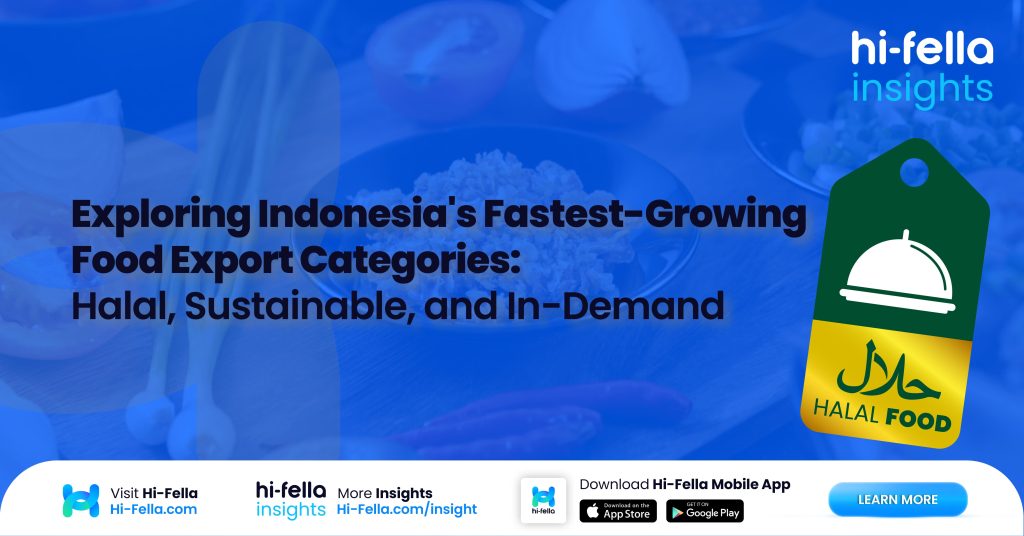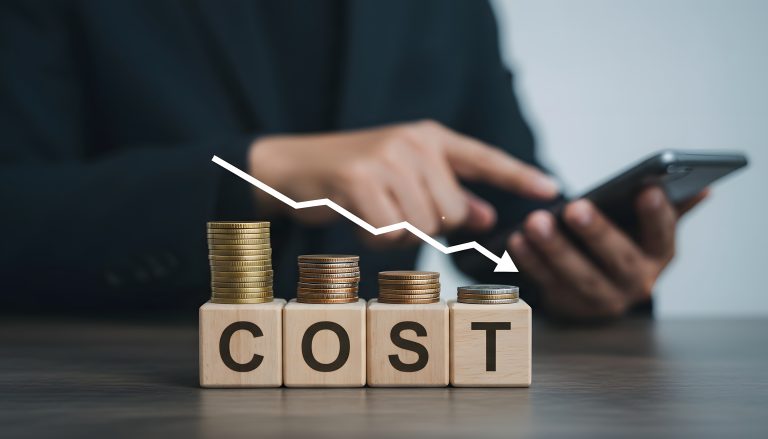Indonesia is a nation known for its vast archipelago, rich cultural diversity, and, increasingly, its rapidly expanding food export industry. As the world’s largest Muslim-majority nation, Indonesia holds a unique position in the global food market, especially in categories such as halal-certified foods, sustainable products, and functional health-oriented food items.
These categories are not only growing but gaining immense traction in regions like the Middle East, Europe, Japan, and North America. In this article, we explore Indonesia’s fastest-growing food export categories, diving into the key factors that are driving their rise and how the country is tapping into global trends.
Table of Contents
Halal Food Boom — Indonesia’s Edge in the Global Muslim Market
Indonesia’s position as the world’s largest Muslim-majority country gives it a distinct advantage in the global halal food market. Halal certification is a significant industry within Indonesia, and with a population of over 270 million people, nearly 87% of whom are Muslim, the country is well-positioned to cater to the ever-growing demand for halal products worldwide.
The Global Halal Food Market
According to the State of the Global Islamic Economy Report, the global halal food market is expected to reach $1.9 trillion by 2025, driven by the increasing Muslim population and growing awareness of halal dietary laws. This presents a lucrative opportunity for Indonesia, which is taking active steps to increase its halal food exports.
Rising categories like halal snacks, beverages, and frozen meals are gaining popularity in the Middle East, Malaysia, and Central Asia, where halal food consumption is integral to the cultural and religious practices of the region. Indonesia’s food industry is capitalizing on this trend by producing halal-certified products that align with international standards and cater to the diverse needs of Muslim consumers.
Indonesia’s Halal Certification Advantage
Indonesia’s halal certification system is robust, and the country has made significant strides in creating a national halal ecosystem. The Indonesian Ulema Council (MUI) oversees halal certification, ensuring that products adhere to Islamic dietary laws. This certification has become an essential tool for Indonesian food exporters looking to tap into global halal markets. With the government’s ongoing support for halal initiatives, Indonesia is well on its way to becoming a global leader in halal food exports.
For instance, halal-certified snacks like chips, confectioneries, and plant-based alternatives are gaining popularity in the Middle East. Similarly, halal beverages such as fruit juices, flavored waters, and energy drinks are being exported to Malaysia, Saudi Arabia, and other Muslim-majority countries. Indonesia’s halal-certified frozen meals, particularly those featuring traditional Indonesian flavors, are also making their way to the Middle East, offering both convenience and authenticity to Muslim consumers globally.
Sustainable and Organic Products on Food Export
Sustainability and organic certification have become crucial factors for consumers worldwide, and Indonesia is positioning itself as a key supplier of sustainable and organic food products. Global trends show a strong preference for products that are traceable, low-impact, and certified to meet high environmental standards.
Organic Food Products
Indonesia is already known for its coconut sugar, cacao, palm oil derivatives, and herbal teas—all of which are increasingly being sought after in the global market due to their organic and sustainable farming practices. These products cater to a growing demand, particularly in Europe, Japan, and the United States, where consumers are becoming more conscious about the environmental impact of their food choices.
The rise of organic coconut sugar has been one of the most notable trends. As a low-glycemic alternative to refined sugar, organic coconut sugar from Indonesia is gaining popularity in Europe and North America, where health-conscious consumers are increasingly seeking alternatives to traditional sugars. Similarly, sustainable palm oil derivatives from Indonesia are being sought after by food manufacturers looking to meet sustainability targets and avoid contributing to deforestation. Indonesia’s efforts to adhere to the Roundtable on Sustainable Palm Oil (RSPO) standards have strengthened its position as a reliable supplier of sustainable palm oil.
Certifications Driving Exports
To further enhance its appeal in international markets, Indonesian food exporters are increasingly seeking certifications such as USDA Organic, EU Organic, and Rainforest Alliance. These certifications provide third-party verification that the products meet rigorous environmental and sustainability standards, giving Indonesian products a stronger global footprint. This trend is particularly significant in markets like Europe and Japan, where consumers are highly selective about the origin and sustainability of the products they buy.
Functional & Processed Foods Gaining Momentum
In recent years, the demand for functional foods—foods that provide health benefits beyond basic nutrition—has been on the rise, particularly in Asia and North America. Indonesian food manufacturers are tapping into this demand by producing a range of ready-to-eat and functional products that appeal to consumers looking for convenience and health benefits in one package.
Growing Categories in Functional Foods
Among the most promising categories are instant noodles with added health benefits, herbal jams, and fortified drinks. Instant noodles, traditionally known for their affordability and convenience, have now been given a health-focused makeover with added vitamins, minerals, and other functional ingredients. This trend is particularly strong in markets like South Korea, China, and the United States, where consumers are seeking convenience without compromising their health.
Herbal jams, made from Indonesia’s wide variety of native plants and herbs, are gaining attention for their immune-boosting properties and natural sweetening alternatives. These jams, often made from ginseng, turmeric, and ginger, are highly regarded in markets focused on functional health foods.
Indonesian Startups Innovating in the Space
Indonesian food startups are also emerging in the functional food space, bringing new and innovative products to the market. Many of these startups are focused on creating healthier versions of traditional Indonesian foods and beverages, leveraging local ingredients with proven health benefits. These products, such as fortified beverages made from local fruits and herbs, are gaining traction in international markets where functional foods are in high demand.
Export data highlights that countries like South Korea, China, and the United States have seen a marked increase in demand for Indonesian functional food products, particularly in categories like fortified beverages and healthy snacks. The export growth of these products underscores the increasing global interest in functional foods that offer convenience without compromising health.
Challenges and Enablers: From Certification to Logistics
While Indonesia’s food export industry has experienced impressive growth, there are still several challenges that exporters must navigate. Issues such as halal certification bottlenecks, port efficiency, and cold chain limitations can hinder the smooth flow of goods, particularly for perishable products.
Certification Bottlenecks
Obtaining halal certification can be a lengthy and complex process, particularly for new exporters or small and medium-sized enterprises (SMEs). However, the national halal ecosystem roadmap and increased government support are helping to streamline certification processes, making it easier for Indonesian exporters to access halal markets.
Port Efficiency and Cold Chain Challenges
Logistical challenges, such as port congestion and limitations in cold chain infrastructure, have also been a concern for Indonesian exporters. However, the government is investing in improving port efficiency and cold chain logistics, ensuring that perishable and time-sensitive products, such as frozen meals and fresh produce, can be transported more effectively.
Enabling Factors for Export Growth
Despite these challenges, there are significant enablers that are driving export growth. Indonesia’s commitment to increasing government support for halal certification and food export regulations, along with the rising popularity of digital trade platforms, is empowering SMEs to scale their exports and reach international markets. These platforms are facilitating smoother trade processes by connecting Indonesian exporters with global buyers, providing them with the tools and resources to thrive in an increasingly competitive global market.
Join Hi-Fella Today!
Indonesia’s fast-growing food export categories—halal, sustainable, and functional—are paving the way for the country to become a major player in global food trade. Whether you’re a buyer seeking certified halal, organic, or functional foods from Indonesia, or an Indonesian exporter looking to expand internationally, Hi-Fella is your trusted digital trade gateway.
Hi-Fella offers exporters access to a global network of verified partners, enabling them to showcase their products to demand zones worldwide. With digital tools, market insights, and a streamlined trading platform, Hi-Fella empowers businesses to thrive in the world of sustainable and high-demand food trade.








